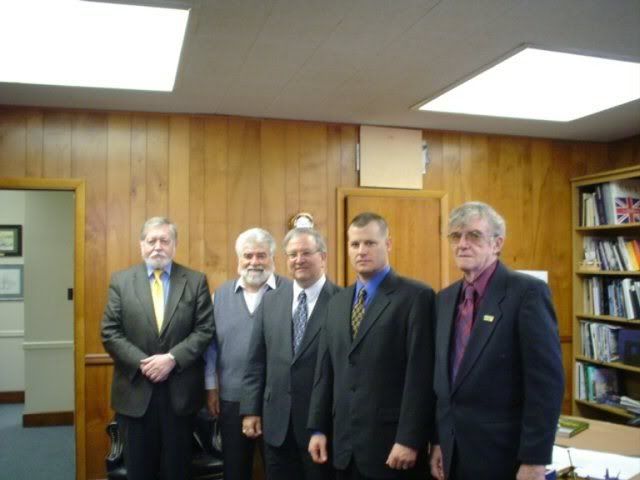Elk Grove man remembers the Pueblo
http://www.dailyherald.com/story/?id=122653
It's the reason Rick Rogala spent 1968 as a captive in North Korea, enduring beatings and paltry prison meals of gummy rice and turnips served in a water pail.
For the Elk Grove Village man, the Navy spy ship USS Pueblo is both the source of nightmares -- and pride.
He won his freedom after 11 months, but the USS Pueblo still stands prisoner 40 years after its capture. Tethered on the Taedong River in Pyongyang, the only commissioned U.S. Navy ship in foreign hands is promoted as a trophy celebrating the communist nation's Cold War conquest.
One sailor was killed and the surviving 82 crew members held as prisoners when torpedo boats and airplanes attacked on Jan. 23, 1968.
Remembering the Pueblo
Rogala, who was 20 years old when captured, not only wants the public to "Remember the Pueblo," a catchphrase coined at the time in a push for the U.S. to broker freedom for the crew, but he is championing the ship's return.
"I know we're dealing with a country that's hard to talk to, but 40 years later it's time," Rogala said.
He wants to bring the ship back to showcase at a museum in Pueblo, Colo., for which the ship is named, and honor the legacy of the sacrifice of the crew members. An anonymous donor a few years ago gave the veterans property to house the ship
.
Rogala hopes to present the Pueblo story without the taint of propaganda he says will overshadow its legacy as long as it's moored in North Korea.
Cold War prisoners
While the North Korean government says the capture was justified as the Pueblo had crossed into their waters, U.S. officials say the ship never trespassed.
Forty years later, there is no dispute that the Pueblo was dispatched to monitor ship movements and intercept messages.
"We were there to collect intelligence, but we were in international waters, so it's fair play," Rogala said.
He had joined the Naval Reserves rather than be drafted to serve in the Army during the Vietnam War. He left his Niles home to report to San Diego to ship out on the Pueblo in fall 1967.
After a month in Japan, the Pueblo ventured toward North Korea.
As far as Rogala knew, this was a "non-risk mission." He wasn't trained in communications intelligence, but he knew there were officers aboard with those skills.
The events of midday Jan. 23 four decades ago steered the Pueblo's fate into more dangerous waters about 15 miles off the coast of North Korea on the Sea of Japan.
Torpedo boats and airplanes descended on the ship as sailors rushed to dump sensitive material overboard in an effort to protect military secrets. The Pueblo carried two machine guns, but neither was mounted.
"It was a really scary episode. Bullets flying over your head," said Rogala, who was working as a mess cook during the attack.
Amid the barrage of bullets, the captain decided to surrender and allow the North Koreans aboard, Rogala recalls.
It was a decision that led to intense criticism of Pueblo Cmdr. Lloyd Bucher, who endured savage torture until the crew's release on Dec. 23, 1968. He faced the potential of a court martial for surrendering without firing a shot.
Blame followed the Pueblo survivors back home but Rogala himself blames the U.S. Navy, saying "they should have prepared us better" for such a risky spy mission.
Rogala and his shipmates were blindfolded, strip-searched and taken off the ship by gangplank to board a bus after the siege.
When his captors vowed the sailors would be OK if they obeyed their rules, Rogala didn't believe them.
Nightmare begins North Korean soldiers piled the 82 crewmembers into a train for an overnight trip, then stopped in the freezing cold and forced the prisoners off the train for what they saw as a photo opportunity.
"For a while there, I thought it was the end," Rogala said, pausing from time to time as his eyes seemed to rove to a distant place. "I still have nightmares."
They were taken to a building the Pueblo crew dubbed "the barn," and packed into rooms, with eight bunking with Rogala.
Despite the threat of death by firing squad, Rogala only offered his name, rank, service number and date of birth.
The Pueblo's six officers were separated and faced the harshest torture. The North Koreans "knew that they would know more, so they got the worst of the beatings," Rogala said.
He suffered his most severe beating during what came to be known as Hell Week.
The North Korean soldiers had discovered that the captive sailors flashing an obscene gesture weren't extending the "Hawaiian good luck sign" as the sailors told them.
"I got a blow to the face where my teeth were loose, and I was kicked to get back up," Rogala said. "I must have given them the wrong answer because I got another blow to the head. I could wiggle my teeth and everything. It was unbelievable."
A year 'wiped off'
Americans who lived through 1968 have vivid memories of that tumultuous year: the assassinations of Martin Luther King Jr. and Robert F. Kennedy, the Tet offensive in Vietnam, and the Democratic convention in Chicago.
Rogala had to hear about these events from his captors. To him, it all sounded like propaganda.
"It's a year of my life just wiped off," he said.
Crew members would get about 15 minutes a day to go outside. They could write letters home, but their captors monitored their words.
Rogala recalls sending a letter to his parents in Niles, trying to communicate in a code that all was not well. He told them to say "hello" to an uncle who had died.
The prisoners also were allowed to play cards in the evening for an hour. Sometimes they would write lyrics to songs.
"Thank God we were with other people that would say, 'We're going to get out,' " Rogala said. "Some were lifting others up."
Freedom's price
Freedom for the Pueblo crew came after a grueling 11 months when the United States agreed to apologize. Once the crew was freed, the U.S. government reneged.
It wasn't until 1989 that Rogala and his shipmates earned prisoner of war designation, an upgrade from their "detainees" status.
Now, the hope of returning the USS Pueblo home motivates 60-year-old Rogala. He has reached out to congressional and state representatives for help but he hasn't found support yet.
The plight of the USS Pueblo continues to expose the wounds of the Cold War.
While North Korea and the United States have made progress in resolving the dispute over its nuclear program that led President Bush to describe its regime as part of the axis of evil, normal relations seem elusive.
In recent years, North Korea has tried to use the Pueblo as a bargaining chip, offering to return the ship in exchange for a visit from a prominent U.S. official.
U.S. Navy officials didn't return calls for comment on chances of the ship's return.
The ship in Pyongyang is used as a tourist attraction where visitors can view the Pueblo's encryption machines and radio equipment as North Korean tour guides relay the story of its capture.
North Korean officials used Wednesday's anniversary of the capture to say the United States should remember the "bitter lesson" of the Pueblo.
"The incident was a product of the U.S. gangster-like policy of aggression," the nation said in a statement.
For Rogala, that points up the need for the ship's return. He and the other Pueblo survivors will meet this fall at a reunion, sharing stories and calling for the ship's release.
"I need to put this behind me totally," he said. "It will never be final in my mind until the ship comes back."





















